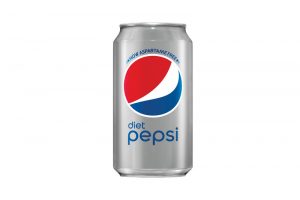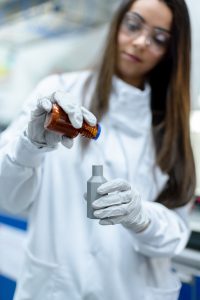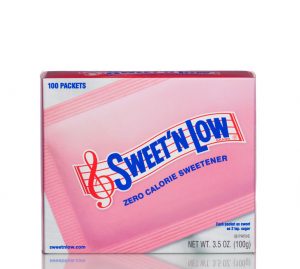
On April 24, 2015, PepsiCo® announced that it was dropping aspartame in Diet Pepsi. The broadcast resonated around the world. But, PepsiCo replaced aspartame with two other controversial sweeteners, sucralose and acesulfame-K. The question to ask is why did they make such a major move?
Flashback to 1972 when Dr. John Olney, PhD, MD, Washington School of Medicine, began his research on the newest revolutionary diet sweetener, aspartame.
When he first sliced open the brains of his laboratory mice fed this chemical sugar, he discovered that aspartame had eaten holes inside their brains.
Why did it take decades before PepsiCo surrendered their use of this controversial artificial sweetener? Many people wonder why aspartame is still on the market today after all these years, and why the FDA continues to defend it.
If you believe what you’re being told by the powers that be, then you are still using the diet sweeteners thinking they are safe. If you are taking medications for the side-effects caused by artificial sweeteners, stop using sugar-free products!
Especially if you’re taking your meds with a diet cola.
We’ve Known All Along

The safety of the artificial sweeteners remains one of the most controversial, and confusing, topics in consumer history. The lack of good information about the history of the artificial sweeteners has kept you in the dark, so stick with me, and I’ll keep putting the truth about their health dangers out there.
In the 1970s, researchers like Dr. John Olney, warned the FDA, the US Senate, and GD Searle (aspartame’s creator) that aspartame was harmful to human health, and that it should not be put in the public food supply.
Numerous research scientists predicted decades ago that aspartame would cause the illnesses and diseases that we are witnessing today – obesity, sexual dysfunction, birth defects, dementia, hyperactivity, brain tumors, and cancer.
The artificial sweeteners transformed the food industry and created a multi-billion dollar “sugar-free fad”, and corporate and pharmaceutical profits have soared as a result of the diet industry. Today, the competition for market shares has escalated, and so has obesity and the health issues these scientists predicted decades before.
For over half a century, Monsanto Chemical Company cornered this market and benefited from owning the exclusive rights to both saccharin and aspartame. When their patents expired, everyone wanted a piece of the pie, and today, the rivalry has escalated into an outright sweetener war.

The Sweetener Wars
This sweetener war started in the United States in the 1960s as a research row, but today, this battle to win your dollar has spread worldwide.
The safety of the artificial sweeteners is a victim in this information war; it’s a battle of health versus profit, and has become a heated competition between the diet sweetener-makers.
The safety of the artificial sweeteners has been contested in courtrooms, in Washington D.C., over the AP Wire, in the barracks of the Middle East, in prestigious research labs, in doctors’ offices and hospitals, in the cockpits of jumbo-jets, on Wall Street, and in your home.
Thanks to the Internet, consumers know more today about the artificial sweeteners than we knew 60 years ago, but one thing has not changed – the truth behind the harmful health effects caused by the diet sweeteners has yet to be fully released.
Millions of people worldwide are experiencing dangerous health reactions to the diet sweeteners. Research studies from all over the world continue to prove that the diet sweeteners cause obesity, memory loss, fetal deformities, infertility, cancer, and childhood diseases.
Consumers have more questions than answers, and bottom-line, people want to know which diet products are safe to use – if any.
Consumers want to know why Pepsi ditched aspartame, and why the FDA approved this artificial sweetener if they knew it caused cancer.
Saccharin

This battle began with saccharin found in the pink pack of Sweet n’ Low®. Saccharin never caused cancer, and saccharin was safely used in the original Coca Cola® formula beginning in 1902 before it was sacrificed 80 years later for aspartame’s profits.
Choosing which diet sweetener to use is easy when you know the truth about all of them.
I will continue to expose the stories that have never been seen before, sharing the events that expose stevia’s big battles for FDA approval to why using sucralose found in Splenda® is no different than drinking from your chlorinated swimming pool.
It is your personal choice whether you choose to use the artificial sweeteners, or not, but you deserve to know the whole story behind each of the diet sweeteners marketed today; information that has been concealed since the 1960s.
For the health benefit of all ages around the world, this sweetener war for profits will end once everyone knows the truth behind this corrupted diet industry.
So stop using these toxic sweeteners, and maybe you can quit taking those meds needed for the side-effects they cause.
_______________
If you want to learn more about healthy living and disease prevention, contact me at janethull.com. Remember that you are never alone when you are looking for good health!
I look forward to supporting you on your journey to alternative health and wellness.
_____________
Disclaimer: This article is for informational purposes only, and is educational in nature. The FDA may not have evaluated some of the statements. This article is not intended to diagnose, treat, cure, or prevent any disease. Please discuss with your own, qualified health care provider before adding supplements or making any changes to your dietary program.
Before taking vitamins, consult your doctor; pre-existing medical conditions or medications you are taking can affect how your body responds to multivitamins.
You have our permission to reprint this article if you attribute us with a live back-link to this article and the youtube links. http://www.janethull.com/
_______________